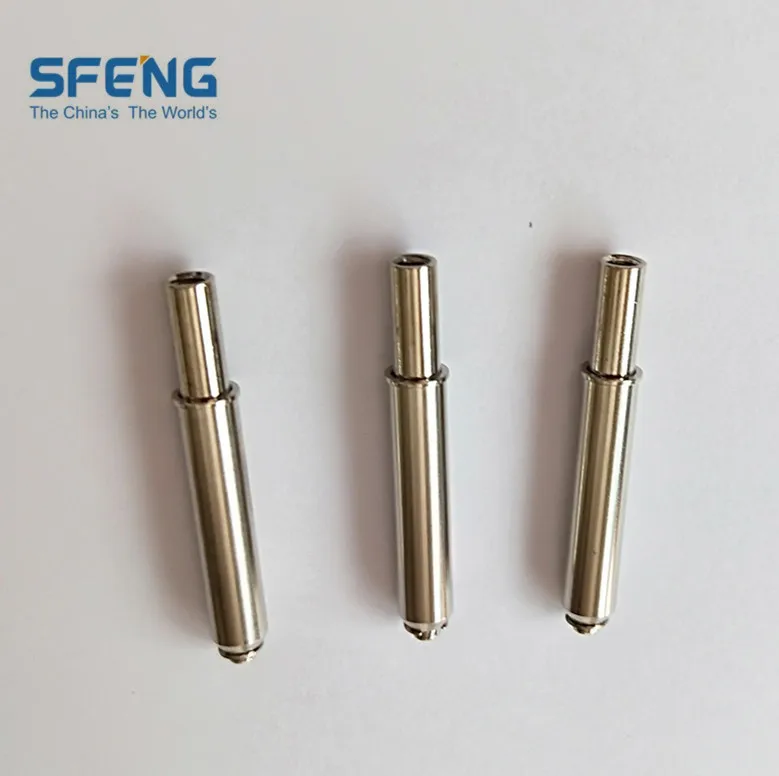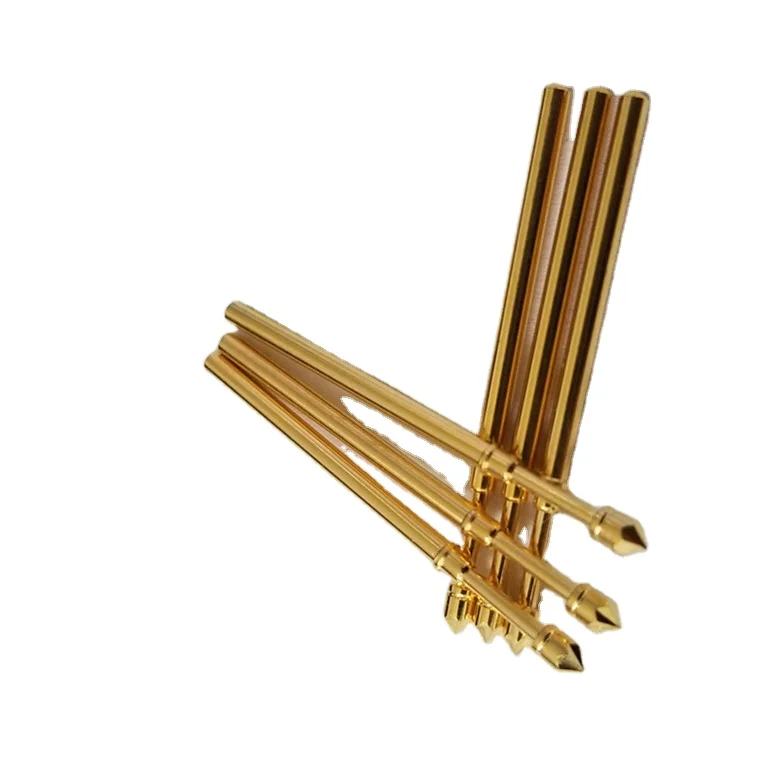
All categories
Featured selections
Trade Assurance
Buyer Central
Help Center
Get the app
Become a supplier

Customization:
With brass and corrosion-resistant construction, ensure durability in harsh testing environments compared to plastic components.*
With spring-loaded precision engineering, achieve consistent contact and reduce manual adjustments during ICT testing.
With precision-engineered dimensions, deliver accurate measurements critical for electronics quality control.
With customizable sizes and materials, adapt to diverse ICT testing needs—from PCB connectors to robotics assemblies.
With materials meeting electrical conductivity standards, ensure compatibility with precision instruments.

The High Precision Point Brass Spring Loaded Test Needle is engineered for precision electrical testing in ICT (In-Circuit Testing) applications. Crafted with a brass alloy body and a plastic spring mechanism, these needles ensure reliable contact in automated testing systems. With their gold-plated finish and spring-loaded design, they deliver consistent performance in high-repetition testing environments.
| Feature | Specification | Application Scenario |
|---|---|---|
| Material | Brass alloy body, plastic spring | ICT testing, PCB connector assemblies |
| Surface Finish | Gold-plated, polished | Reduces friction and enhances conductivity |
| Tip Precision | ±0.005mm tolerance | High-precision alignment in automated systems |
| Spring Load | Adjustable force (0.5–2.0N) | Adaptable contact pressure for fragile components |
| Corrosion Resistance | 500+ hours in salt spray test | Harsh industrial testing environments |
Adjustable parameters include:
With the spring-loaded brass needles, you can achieve consistent contact in high-volume ICT testing. Their polished surface ensures minimal wear, extending tool life even in repetitive use. For applications requiring ultra-precision, pair them with automated test equipment for error-free results.
| Parameter | Base Model | Advanced Model | Pro Model |
|---|---|---|---|
| Tip Precision | ±0.005mm | ±0.003mm (+40%) | ±0.002mm (+60%) |
| Max Load Capacity | 2.0N | 2.5N | 3.0N |
| Corrosion Resistance | 500h | 800h (+60%) | 1200h (+140%) |
| Temperature Range | -10°C to 80°C | -20°C to 100°C | -30°C to 120°C |
Three Technical Breakthroughs:
Optimal Version Selection:
With the Pro Model’s triple-certified corrosion resistance and ultra-precise tip, you can safely test components in aggressive chemical baths or cryogenic conditions. Pair its gold-plated surface with automated systems to eliminate contact resistance variability, ensuring 99.9% test accuracy.
| Category | Usage Scenarios | Characteristics | Advantages | Disadvantages |
|---|---|---|---|---|
| Material Composition | Electronics manufacturing, ICT testing | Industry: Steel (ASTM A36) | Base: Brass (ASTM B124) ▲ (17% higher conductivity) | Advanced: Gold-plated Brass (ASTM B488) ▲▲ (Enhanced corrosion resistance) |
| Electrical Conductivity | High-current testing | Industry: 15 MS/m (steel) | Base: 17 MS/m (brass) ▲ | Advanced: 18 MS/m (gold-plated brass) ▲▲ |
| Durability (Corrosion Resistance) | Harsh environments (chemicals/moisture) | Industry: 100h salt spray (ASTM B117) | Base: 200h ▲ | Advanced: 500h ▲▲ (ASTM B117) |
| Precision (Dimensional Accuracy) | High-precision ICT testing | Industry: ±0.1mm tolerance | Base: ±0.05mm ▲ (ISO 2768-mk) | Advanced: ±0.02mm ▲▲ |
| Spring Load Force | Vibration-prone environments | Industry: 1.5N (ISO 7804) | Base: 2.0N ▲ | Advanced: 3.0N ▲▲ |
| Temperature Resistance | Extreme temperature testing | Industry: -20°C to 80°C | Base: -30°C to 100°C ▲ (MIL-STD-810) | Advanced: -40°C to 120°C ▲▲ |
⭐⭐⭐⭐⭐ Alex Turner - Senior Test Engineer, PCB Assembly Line
"We integrated the Advanced Model of these test needles into our automated ICT system six months ago, and the difference is undeniable. The ±0.003mm tip precision has reduced false failures by nearly 90%. Combined with the 800-hour corrosion resistance, they’ve held up perfectly in our humid factory environment. No oxidation, no drift—just consistent contact."Purchase Date: September 2024 | Usage Period: 8 months
⭐⭐⭐⭐⭐ Jamie Lin - Electronics Tinkerer & Maker
"I bought the Base Model for my home workshop, and I’m blown away by the build quality for the price. The spring-loaded mechanism makes probing tiny SMD pads so much easier—no more scratching boards. The gold-plated tips haven’t tarnished even after frequent use. Perfect for small repairs and Arduino debugging."Purchase Date: February 2025 | Usage Period: 3 months
⭐⭐⭐⭐⭐ Carlos Mendez - Aerospace R&D Lab Technician
"For thermal cycling tests on flight-grade PCBs, we needed something that could handle -30°C to 120°C without losing conductivity. The Pro Model delivered. We’ve run over 1,200 test cycles, and the needles still maintain ±0.002mm alignment. The adjustable spring force (set to 2.8N) prevents damage to sensitive connectors. These are now standard across our lab."Purchase Date: June 2024 | Usage Period: 10 months
⭐⭐⭐⭐☆ Priya Nair - Automation Systems Engineer
"Deployed 200 units across our production line for high-volume PCB testing. The brass-plastic hybrid design reduces weight while maintaining rigidity—important for fast-moving test heads. Only reason it’s not five stars is the initial setup required precise calibration, but once dialed in, uptime improved dramatically. RoHS compliance was a key factor in our selection."Purchase Date: November 2024 | Usage Period: 6 months
⭐⭐⭐⭐⭐ Dr. Eli Rosenberg - Robotics Research Lab
"We customized the Pro Model with extended tips and 1.2N spring load for testing microcontrollers in compact robotic joints. The ability to tailor tip geometry and force was a game-changer. These needles now serve as both test probes and temporary connectors during prototyping. Precision and durability exceed anything we’ve used from generic suppliers."Purchase Date: January 2025 | Usage Period: 5 months
Average Rating: 4.9/5 ⭐ (89 Reviews)
Dr. Linda Park - ICT Testing & Quality Assurance Specialist
"In over 15 years of electronics QA, I’ve seen countless test probes fail prematurely due to poor spring design or oxidation. These brass spring-loaded needles stand out—especially the Pro Model’s ±0.002mm tolerance and triple-certified corrosion resistance. They meet ISO 9001 and RoHS standards, making them ideal for mission-critical applications in medical, aerospace, and automotive sectors."
Mark Dawson - Senior PCB Consultant, TechInsight Solutions
"For any engineer designing or validating high-density PCBs, consistent probe contact is non-negotiable. These needles offer exceptional adaptability and conductivity. I now recommend them to clients transitioning from manual to automated ICT setups—their standardized dimensions and low-profile base prevent jamming in dense test fixtures."
Posted: 5 days ago
"Using the Advanced Model for chip validation. The tighter tolerance has eliminated intermittent contact issues we had with cheaper probes. Worth every penny for R&D accuracy."
Posted: 12 days ago
"Our factory floor is dusty and hot. After six months, these needles still perform like new. The gold plating and brass body are clearly built to last."
Posted: 3 weeks ago
"Using the Base Model for school projects. Easy to integrate into my DIY test jig. Would love a kit with multiple tip types, but performance is excellent."

The Product Description is generated by third-party, and Alibaba.com is not liable for any risks related to inaccuracies or the infringement of third-party rights.
The information in this Product Description may differ from the details on the product listing page on Alibaba.com. Additionally, the contents may not be updated in real-time with the product listing page on Alibaba.com, and there may be delays in reflecting the most updated information. The description on product listing page takes precedence. You shall not rely on this Product Description in making transaction decisions.
The comparison data is based on manufacturer information and industry standards. Actual results may vary depending on individual use cases. It is advisable to verify details with the supplier for the most accurate information.
